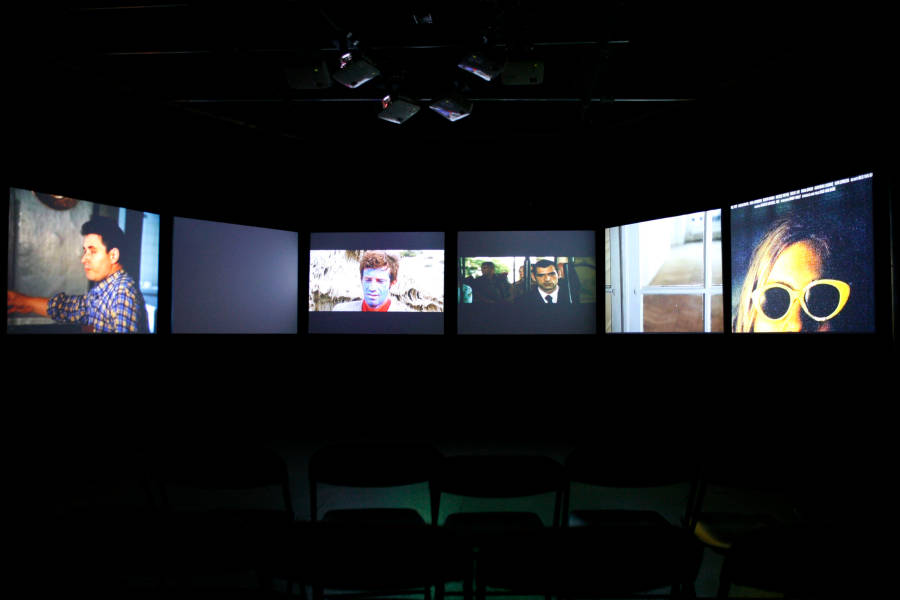Antje Ehmann, Harun Farocki
 Antje Ehmann, Harun Farocki, Feasting or Flying, 2008
Antje Ehmann, Harun Farocki, Feasting or Flying, 2008
© MuTphoto/ Barbara Braun
16 December 2008 - 25 January 2009
Mala galerija, Slovenska cesta 35, Ljubljana
Typical of Farocki's unique poetics is his critical dialogue with the technocratic present. One of his earliest films, The Inextinguishable Fire (1969), on the napalm bomb production process and the overall social context of its use, earned him the notoriety of being "a nuisance." His principal topics are the social changes brought about by modern-day "media revolutions." Using associative editing, strictly objective composition, and quasi-educational commentaries, Farocki endeavors to portray in his films the extent to which our society is controlled by the power of images. His works was recently included in documenta 12 and Manifesta 7.
At the Mala galerija Farocki is presenting Feasting or Flying (2008), his latest six-channel installation produced together with Antje Ehmann, and both of his two-channel installations, On Construction of Griffith's Films (2006) and Counter-Music (2005), which were presented at the exhibition Cinema like never before at the Generali Foundation in Vienna (2006).
In On Construction of Griffith's Films Farocki picked a sequence from Griffith's Intolerance (1916), which shows a dialogue between a man and a woman, filmed and edited as shot and counter shot. The installation reproduces the shot on two monitors to reveal its narrative character /.../. The narrative shot/counter shot form, which would later become the norm for depicting dialogue in film, was still novel when Intolerance was made.
In Counter-Music the city today is presented as rationalized and regulated as a production process, almost a machine for living and working. Farocki wanted to "remake" the city films, but with different images. Limited time and means demand concentration on just a few, archetypal chapters.
Sharing the title of the festival "Fressen oder Fliegen" (Feasting or Flying, Berlin), the work alludes to the statement, "Some dissect a bird in order to eat it, others in order to discover how to fly," and continues to explore the method of film analysis by means of dismantling and assembling. In their video installation about the film genre, created especially for the festival, the two artists explore the filmic shot/counter shot technique, dissect scenes and camera angles and project them simultaneously onto the stage.
Born in 1944 in Nový Jicin in German-annexed Czechoslovakia, Harun Farocki lives in Berlin. For a long time he was the editor of the magazine Filmkritik (1974 - 1984). He works as an artist in a number of media: he has made almost 90 films, often stages multimedia installations, publishes books, and has worked academically as a visiting professor at universities in Berlin, Berkeley, and Vienna.
Born in 1968 in Gelsenkirchen, Antje Ehmann lives in Berlin. She is a film theoretician, researcher, and curator. Between 1995 and 1999 she worked on the team organizing the film festivals Duisburger Filmwoche and Internationalen Kurzfilmtage Oberhausen. Between 1999 and 2003 she collaborated on the DFG project Geschichte des dokumentarischen Films 1895 bis 1945 (History of Documentary Films 1895 - 1945). Since 2004 she has focused on diverse curatorial projects (mostly together with Harun Farocki).
The exhibition curator is Igor Španjol.
This project is supported by the Ministry of Culture of the Republic of Slovenia.
Sign up for the MG e-newsletter
Museum of Modern Art
Windischerjeva ulica 2
SI-1000 Ljubljana, Slovenia
Phone
MG+:+386 (0)1 2416 800,
+386 (0)1 2416 834
+MSUM: (0)1 2416 825
Fax: +386 (0)1 2514 120
E-mail: info@mg-lj.si
MG+MSUM
History of the MG
Reconstruction
Opening of the renovated MG
Staff




 MG blog
MG blog
